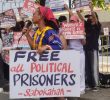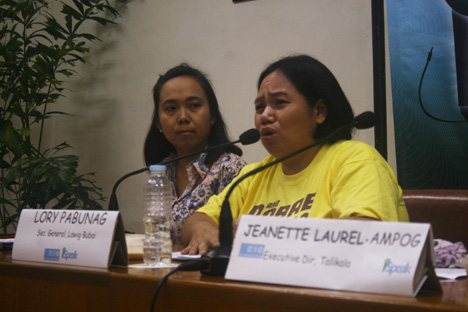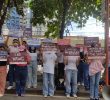But despite �waning� U.S. support of her, Arroyo not on shaky footing, says analyst
DAVAO CITY � The United States government should now review how its military aid and security assistance to the Philippines are being spent by the Arroyo administration, a policy analyst of a major American think tank said this week.
Washington should also pressure President Gloria Macapagal-Arroyo into ensuring that killers of Filipino journalists are brought to justice, said Dana R. Dillon, a senior policy analyst at The Heritage Foundation, a respected and influential American think tank, in an op-ed piece published last Sunday by Fox News.
Dillon criticized the Arroyo administration for, according to him, resorting �to the methods many dictators use to silence criticism.� Arroyo, he said, �appears to have given up on convincing her constituents of her competence.�
Dillon cited the killings of Filipino journalists and the failure by the government to apprehend the killers. International media organizations have denounced the Arroyo administration for the continued killings of journalists and the failure by authorities to bring the perpetrators to justice.
The Philippines, according to the New York-based Committee to Protect Journalists, is the �most murderous� country in world for journalists. Majority of the victims were singled out for assassination. Most of the killings since 1986 � 75 so far, according to the National Union of Journalists of the Philippines � occurred since Arroyo came to power in 2001.
Recently, the government, in trying to head off attempts to oust Arroyo from office, initiated a crackdown on critical segments of the media, raiding newspaper offices, sending troops to networks and threatening journalists with sedition charges.
�In a stunning display of Orwellian �doublethink, Arroyo wants to convince policymakers that her illegal and unconstitutional suppression of journalists actually serves to preserve the constitution and rule of law,� she wrote.
The U.S. Congress and President George W. Bush, she said, �must show her that this �logic� doesn�t fly here, and that this goes for all allies in the global war on terror.�
Instead, she added, the U.S. Congress and President Bush �should review the security assistance provided to the Philippines and ensure that accountability procedures are followed and American-provided equipment and aid is used properly.�
The United States continues to prop up the Arroyo regime, Dillon said, adding that Washington gave more aid to Manila so far this year than in 2005.
�No one claims that President Arroyo ordered or knew of any of the killings of reporters. But government foot-dragging when it comes to apprehending the killers is unacceptable for a country that receives such large amounts of American aid,� Dillon said.
Dillon said there is a �growing awareness� in the U.S. about the deterioration of the rule of law in the Philippines and that this awareness �extends to the White House, where debate continues over whether President Bush should meet with President Arroyo.�
�We have a carrot to offer. Arroyo desperately wants a visit with President Bush to shore up her shaky political situation at home. We should tell her to get serious about apprehending those who kill journalists and about preventing intimidation of the press. If she does, we can discuss a presidential visit. But not before.�
Meanwhile, Pacific Strategies and Assessments, a risk-consultancy group operating in key countries in Asia, including the Philippines, said in an advisory to its client this week that Arroyo, despite what it perceived as waning U.S. support of her regime, is not on shaky ground � for now.
Below is the company�s analysis, titled �Waning, waning,� of the troubles Arroyo continues to face:
The US Department of State last week submitted an annual report to Congress, citing the Philippine government�s �serious problems� in upholding human rights. The report noted the alleged involvement of security forces in extrajudicial killings, disappearances, torture, arbitrary arrest, and detention. It also cited the physical abuse of suspects and detainees, as well as rampant corruption in government. The report followed a New York Times editorial chiding President Gloria Macapagal Arroyo for the national emergency declaration, corruption, election fraud, and media clampdown. US Ambassador Kristie Kenney is sidestepping questions on Washington�s opinion on moves to oust the President, calling it a domestic question for the Philippines to answer itself. She also refused to comment on the President�s campaign to change the charter through a people�s initiative. But what drew an onslaught of strong criticism from Arroyo allies was Kenney�s recent visit to Senate President Franklin Drilon, a leader of the Gloria Resign Movement.
This suggests that Washington�s perceived support for the Arroyo administration may be diminishing as frustration mounts. And just like the US, the influential Catholic bishops of the country last week issued a scathing pastoral letter on the government-sponsored people�s initiative, calling it �dangerously unclear and open to manipulation by groups with self-serving interests.� It added that any moves to change the charter must be based on the common good rather than the interest of political dynasties. Echoing similar concerns, the highly influential Makati Business Club (MBC) warned against hastily pushing for charter change, saying it will adversely affect the economy. Malaca�ang has expectedly denied the New York Times accusations, but has so far remained mum on the State Department report, Kenney�s latest comments, and the MBC warning. As for the church, another former Arroyo ally, Malaca�ang icily retorted that the bishops had no business in politics and should just focus on Church affairs for Lent. It seems that the more Arroyo ensures her stay in power, the longer her list of critics becomes. The government has been releasing propaganda videos to justify Arroyo�s policies and attack her critics, but so far these have been duds.
None of this indicates that Arroyo is on truly shaky footing. Once upon a time, US sway in the Philippines was very strong. A few words from then-US-senator Paul Laxalt to Ferdinand Marcos in 1986 were enough to convince the former dictator he ought to chopper out of the presidential palace and head for exile in Hawaii. But these days, with the Cold War over and the US preoccupied in Iraq and Afghanistan, it is hard to see how Washington would care enough to tip the scales on the Philippines� leadership either way. In fact, US embassy statements in recent years show more interest in Filipinos better using their democratic institutions to make the decision themselves.
The Philippines� government, however, still pores over US statements on its affairs for the minutest shade of meaning. Arroyo, who tends toward the melodramatic anyway, is likely huddling with her advisors about how to win back support from Washington, as well as the MBC and the bishops. Her opponents, who have a keen nose for blood, are probably already sensing the insecurity and getting ready to rattle her further.
(davaotoday.com)










